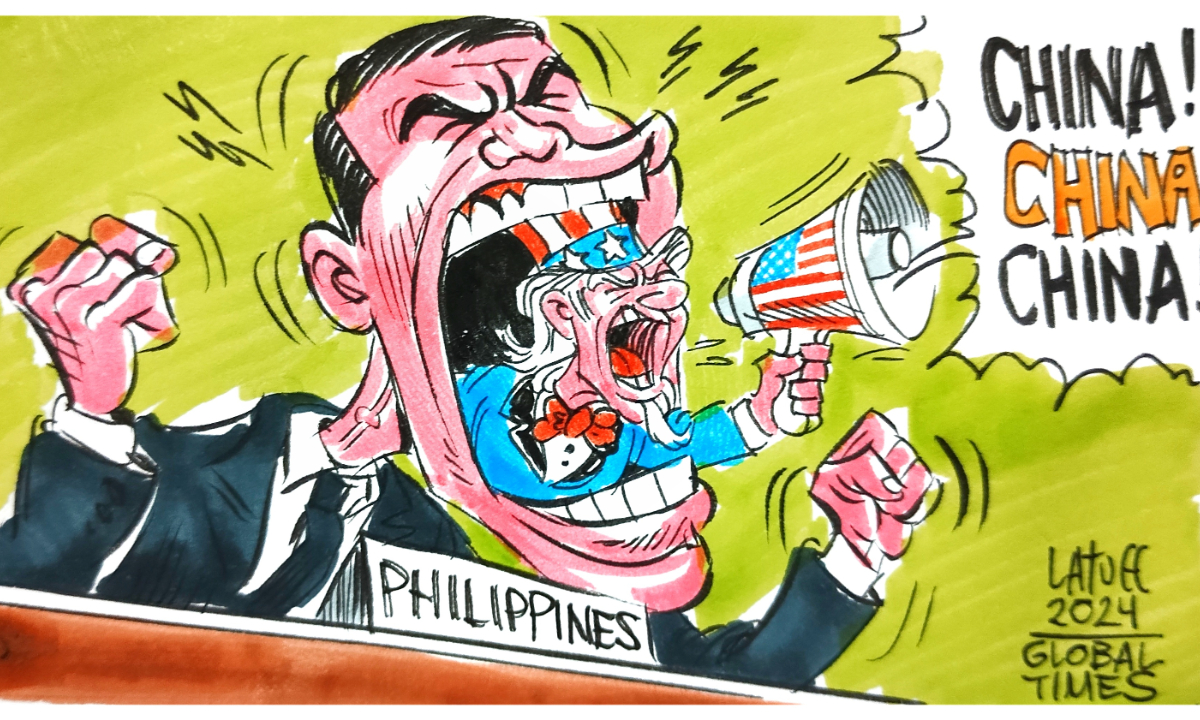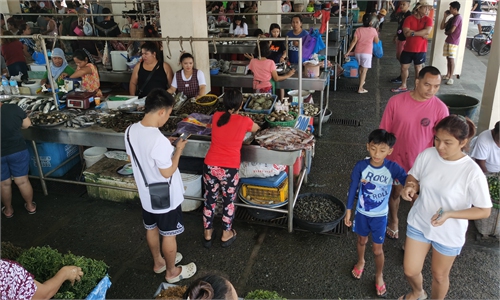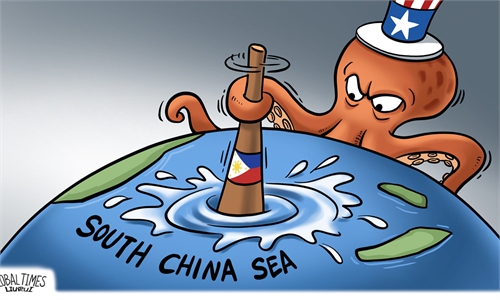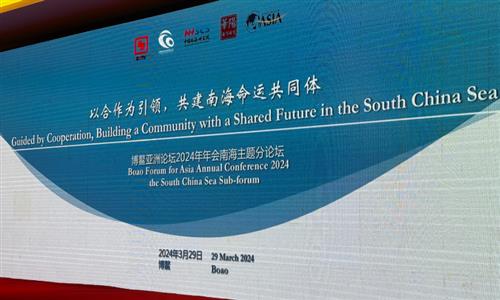Courting Manila, US and its allies try to 'paint a troublemaker as a victim'
Philippines' US-backed provocations 'unpopular among ASEAN states'

Cartoon: Carlos Latuff
China's recent law-enforcement maneuvers in the South China Sea to counter the Philippines' provocation backed by the US were "necessary, professional, restrained and beyond reproach," said the Chinese Foreign Ministry, while Washington and a few non-regional US allies, such as the UK and Canada, have made groundless and biased condemnations against China on the latest incident near China's Ren'ai Jiao (also known as Ren'ai Reef).
Analysts said the risky and irresponsible act conducted by the Philippines are quite unpopular among ASEAN member states, and that Manila should be aware of the danger of being used by the US as a pawn to disrupt the stability and peace of the region.
In response to the complaint from Manila about China's law-enforcement action, Lin Jian, a spokesperson of the Chinese Foreign Ministry, said on Thursday that this operation of the Philippines is absolutely not about "humanitarian resupply.
The Philippine vessels secretly carried construction materials and even weapons and equipment, and they deliberately rammed Chinese vessels. The Philippine side threw water and hurled objects to Chinese enforcement personnel. These acts clearly escalated tensions at sea, and severely threatened the safety of Chinese personnel and vessels, Lin said.
Photos obtained by the Global Times exclusively from the China Coast Guard (CCG) on Wednesday show the CCG's interception, boarding, inspection and expelling of Philippine vessels when they illegally intruded into waters near China's Ren'ai Jiao in the South China Sea on Monday.
"China took necessary measures in accordance with law to safeguard its sovereignty, which was lawful and justified, and done in a professional and restrained manner. It was beyond reproach. China will firmly safeguard its lawful rights and interests. We urge the Philippines to stop infringement and provocation at sea at once. Otherwise, the consequences shall be borne by the Philippines," Lin said on Thursday.
The CCG's new procedures that allow Chinese law enforcement forces to take more decisive action to counter provocations took effect on Saturday, and Manila wants to test the new procedures, and now it has the answer, said a Beijing-based military expert who asked for anonymity.
The latest incident is a proof of China's determination to safeguard its own interest, sovereignty and security, and China is well-prepared to counter any further aggressions and provocations by the Philippines or the US that aim to disrupt regional peace and stability in the future, the expert told the Global Times on Thursday.
China's law-enforcement actions have remained restrained and professional, although the Philippines' acts are dangerous and provocative that deserve more powerful and decisive countermeasures, said experts. This has shown China's sincerity to avoid escalation of tension, analysts said.
US Secretary of State Antony Blinken on Wednesday held a call with Philippine Foreign Secretary Enrique Manalo to discuss China's actions in the South China Sea, which Manila and Washington have called "escalatory." Blinken underscored the US' ironclad commitments to the Philippines under the Mutual Defense Treaty, the US State Department said.
Li Haidong, a professor at the China Foreign Affairs University, told the Global Times on Thursday that the US is just playing the trick of "making a troublemaker into a victim," as everyone can see crystal clear that it was Washington that stands behind all the risky provocations conducted by the Philippines, and when China takes very restrained actions to stop their irresponsible and dangerous behaviors that threaten China's sovereignty and national security, they start to cry out and draw attention.
They have done the same thing during the term of former Philippines president Benigno Aquino III in early 2010s, and the Philippines get nothing eventually after a series of frictions and tensions with China, and the US has never paid for the losses that Manila has suffered, and unfortunately, now the Ferdinand Marcos Jr's administration is repeating the same mistakes, said experts.
In the past few years, with the efforts made by China and other regional countries, including the Philippines during the term of Rodrigo Duterte, the South China Sea has already become a sea of peace, friendship and cooperation. Unfortunately, due to the US military acts in the region, and its collaboration with the Marcos Jr's administration in recent years, the regional peace and stability have been disrupted. The US interference is the root cause of worsening tensions in the region, said Li.
A few US allies like Britain and Canada have followed the US to condemn China's actions, Reuters reported.
On Wednesday, the Chinese Embassy in Canada said in a statement released on its website that ""Canada is not a party to the South China Sea issue, yet frequently makes erroneous statements on this issue. Canada has repeatedly sent warships and helicopters to flaunt its power in the South China Sea under the pretext of safeguarding the freedom of navigation and overflight, which is a serious violation of the purposes and principles of the United Nations Charter, and endangers regional peace and stability."
Lone troublemaker
When the US and its allies that are far from the South China Sea are making groundless accusations and condemnations, no regional ASEAN countries are following the US step to encourage Manila's risky move, analysts said.
"Vietnam, Indonesia and Malaysia all refuse to bring in the external forces to make the South China Sea issue more complicated, as they believe that they can work with China to manage the differences and explore the region jointly, while the Philippines is the one that fails to withstand the interference from the external force," Li noted.
Malaysian Prime Minister Anwar Ibrahim said in a recent interview with Chinese news website guancha.cn that on the South China Sea issue, Malaysia's position is that the regional countries "have to negotiate among friends," and there is no reason to invite external powers from outside.
In April, Malaysian Foreign Minister Mohamad Hasan said during his visit in Beijing that his country opposes "external forces" meddling in the South China Sea, and foreign interference in the region was not welcomed.
Also in April, Chinese and Vietnamese defense ministers signed an MOU on a hotline between the People's Liberation Army's Southern Theatre Command and the Vietnamese navy, which set an example for regional countries to handling maritime disputes, said observers.
In December 2023, Vietnamese Foreign Minister Bui Thanh Son said during a meeting with Chinese Foreign Minister Wang Yi that "the Vietnamese side is willing to work with the Chinese side to maintain peace and stability at sea in accordance with the high-level consensus between the two countries," the Xinhua News Agency reported.




